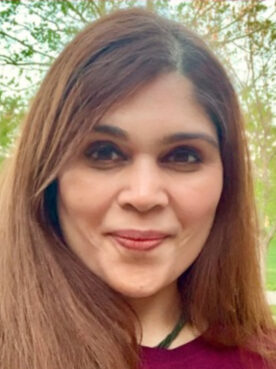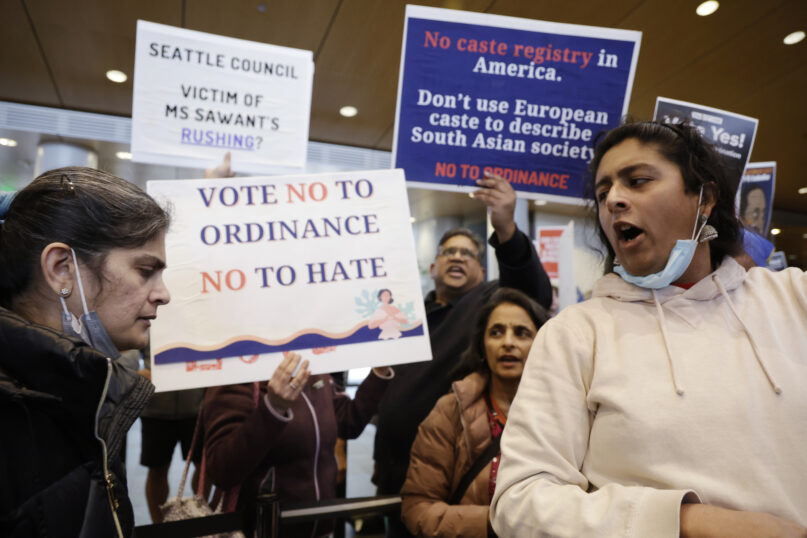(RNS) — The first-ever Caste Con, an event dedicated to “dissolving caste consciousness,” held in Fremont, California, on Sunday (July 16), may sound to the uninitiated as if its point was to oppose discrimination based on India’s social hierarchy that places Brahmins at the top of the social order and Dalits at the bottom.
In fact, the gathering brought together a group of activists who warn that recent efforts to outlaw caste discrimination in the United States only serve to reaffirm caste differences in a way that could negatively affect the U.S. Hindu community and stigmatize Indian Americans in politics, at school and in the courts. Many of the attendees are outspoken opponents of SB 403, a bill headed for a vote in the California State Assembly that would single out caste bias as a violation of the state’s anti-discrimination statute.
Richa Gautam, a data analyst who organized the event, portrays caste awareness as a version of American identity politics that left-leaning politicians use to force presumptions about caste on Indian immigrants such as her, she told Religion News Service in the days before Caste Con.
“Any seepage of identity politics is against multiculturalism,” said Gautam. “It is against progress, it is against even spiritualism, you know, the whole concept of Hinduism.”
Caste differences, a fact of life in India and other South Asian communities around the globe, has caused increasing controversy in the U.S. South Asian immigrant community since colleges and universities began adding caste to their list of differences, along with race and sexuality and gender identity, that were protected against bias. Brandeis University banned caste discrimination over complaints from some Hindus in 2019; the California State University system added caste to their nondiscrimination policy in early 2022.

Richa Gautam. Photo via Twitter
Gautam was inspired to join the fight against these measures in 2020, as California was prosecuting the most prominent legal case of alleged caste discrimination involving the computer giant CISCO Systems. An anonymous CISCO employee, a Dalit, accused two of his managers, Ramana Kompella and Sundar Iyer, of passing him over for a promotion. California’s civil rights department sued the two defendants in a years-long case that ended just this month, when it was dismissed due to lack of evidence.
Iyer made a surprise appearance at Sunday’s Caste Con, claiming that the state prosecutors decided he was a high-caste Hindu based on his last name, even though he identifies as non-religious.
“Ramana and I are the state of California’s best and only example of caste litigation,” said Iyer. “The CRD is supposed to protect civil rights, yet deliberately violated my religious liberty.”
More recently, 12 of the complainants in a 2021 lawsuit that alleged forced labor among “lower-caste” workers on the BAPS Swaminarayan Temple of Robbinsville, New Jersey, retracted their claims, saying they were coerced into making false allegations of caste discrimination.
Yet an often cited report on caste bias released in 2018 by Equality Labs, a Dalit civil rights organization and a co-sponsor of the California bill, found that two-thirds of respondents said they suffered discrimination at work; one-third reported that they had faced discrimination in education.
In an article on Caste Files, Gautam’s website tracking the issue, she characterizes the report as “fake and unscientific.” Other Hindu organizations, including the Ambedkar Phule Network of American Dalits and Bahujans, representing traditionally lower-caste groups, have also criticized Equality Labs’ findings.
“Any survey or any bill that is made without us is looking to butcher our cultural existence,” Sandeep Dedge, a volunteer at APNADB, told the Caste Con audience. “The people with little experience are trying to oppress the contributions of the Dalits and Bahujans.”
Those who reject the need for provisions against caste discrimination say not only that such laws have no place in the United States, but they also deny that caste is primarily a feature of Hinduism. Instead they claim that caste was imposed by British colonizers of India, who fastened on varna — a spiritual term dictating one’s inner nature — and jati — a description of a distinctive social group — and conflated both with caste as a way of ordering Indian society under their rule. It should be removed from American consciousness altogether, they say.
Sudha Jagannathan, a board member of the Coalition of Hindus of North America and longtime California resident, says she never experienced discussions of caste before coming to the United States. She began referring to herself as Bahujan only after caste became a talking point in recent years. To her, caste is a “slur against Hindus” that is already covered under the existing anti-discrimination laws.
“The caste discrimination ban is broadcasting caste consciousness into America in big ways,” said Jagannathan. “The Americans who did not know this, whenever they see a Hindu now, the first question they ask is, ‘What is your caste?'”
California, where a vast number of Indian immigrants live, has long been the center of the discourse about caste in America. In 2006, the Hindu Education Foundation, along with the Vedic Foundation and the Hindu American Foundation, fought in California courts to erase mentions of the caste system, among other stereotypes about the Hindu religion, from the state’s school textbooks. The litigation ended in settlements, with repeated text changes.
RELATED: Caste discrimination laws remain fraught. Here’s why they shouldn’t be.
The SB 403 bill, introduced by Fremont-area Senator Aisha Wahab, began as an effort to name caste as a protected form of discrimination. After passing in the Senate, it was rewritten in the assembly’s judiciary committee after hundreds of Hindu Americans, including those identifying as Dalit or Bahujan, came to give testimonies about why they believe the bill would do more harm than good.
“Too often, Hindu Americans have not advocated for themselves as a faith-based community,” said Pushpita Prasad, a board member of the Coalition of Hindus of North America. “Our goal is to change that.”
Under pressure from CoHNA, Hindu American Foundation, and other groups, the bill’s wording was changed so that it now only mentions caste once.
But in the eyes of these Hindus, any mention of caste is one too many, as they say it only targets the communities that are commonly associated with caste in the American mainstream: Indian and other South Asians. Some in the Indian community say they are being generalized unfairly, especially after making their mark as the highest-earning ethnic group in the United States.
“In some ways, this effort to simplify and streamline us into categories that are comfortable for the rulers is exactly what the British did when they came to India,” said Prasad.





